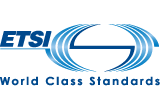Interoperability
Interoperability
To ensure user-friendliness, plugtests and interoperability workshops for the developers and users of the mobile services will be organised with support from ETSI, the European Telecommun ications Standards Institute, to help guarantee interoperability across national borders and, possibly, contribute to the development of new standards.
About ETSI
ETSI, the European Telecommunications Standards Institute, produces globally-applicable standards for Information and Communications Technologies (ICT), including fixed, mobile, radio, converged, broadcast and internet technologies.
ETSI is officially recognized by the European Union as a European Standards Organization. It is a not-for-profit organization with more than 750 ETSI member organizations drawn from 63 countries across 5 continents world-wide. More Information is on its website http://www.etsi.org/about .png) .
.
ETSI Test Specifications
For over 20 years ETSI has been a pioneer among the standardization bodies in recognising the importance of achieving interoperability through testing. Many key ETSI Technologies have an accompanying set of standardized test specifications that may be used by ETSI Members and other organizations in a variety of contexts, ranging from in-house product development to industrial certification schemes.
Validation through ETSI Interoperability Events
One well-proven and cost-effective approach to validate standards for interoperability, and subsequently interoperable products, is through interoperability events, or Plugtests™.
These events, which may comprise just a few or many hundreds of participants, collect engineers and equipment in a neutral environment - possibly distributed - where they can execute a large variety of real-life scenarios in various combinations and with different equipment.
Interoperability events have the additional advantages of optimizing the development of implementations and providing an open forum for resolving issues of non-interoperability and other technical aspects related to standards development and validation. It is a place for engineers to meet and develop interoperable solutions in a very practical environment and to provide feedback to the standardization groups.






